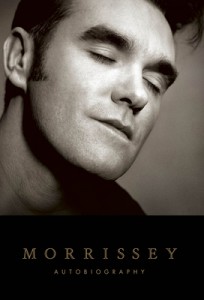December 6, 2013
Why was Morrissey’s Autobiography revised for the U.S. market?
by Christopher King
 British fans of Morrissey who hoped to learn details of the former Smiths frontman’s personal life from his Autobiography, published in the U.K. this fall by Penguin Classics, may have been disappointed—he is mostly mum on the subject, except for a few paragraphs describing his close relationship with Jake Owen Walters in the 1990s.
British fans of Morrissey who hoped to learn details of the former Smiths frontman’s personal life from his Autobiography, published in the U.K. this fall by Penguin Classics, may have been disappointed—he is mostly mum on the subject, except for a few paragraphs describing his close relationship with Jake Owen Walters in the 1990s.
Now comes word that some of the material concerning Walters has been edited or removed altogether from Putnam’s U.S. edition of Autobiography, out this week. Via SPIN:
… [T]he G.P. Putnam’s Sons stateside release apparently does not include the photograph of Walters as a boy that the original contained. It also seems Walters’ name has been removed from a story about a night out with Pretenders’ Chrissie Hynde. WENN reports that these are two of “many details” that have been modified or redacted for this version of Autobiography.
Why have these details been removed from the American edition? None of the relevant passages would seem to represent a liability for defamation or libel lawsuits, especially in American courts where proving such charges is much more difficult than in the U.K.
More likely is that Walters himself privately requested the changes. Their relationship apparently did not end quite as conclusively as is described in the book (Walters photographed the cover of Morrissey’s most recent album, Years of Refusal, in 2009—a fact overlooked in all of the reporting about the pair on the book’s release), and he may have disputed details about events that are now two decades in the past.
Or perhaps frustration with all the inaccurate reporting prompted Morrissey to downplay their relationship in subsequent editions of the book. While the revelation was touted in headlines the world over as a big gay bombshell, in truth the news arrived as more of a whimper than a bang: Morrissey pointedly declines to characterize the relationship as a sexual one, and while the language he uses is certainly romantic (“Every minute has the high drama of first love, only far more exhilarating”), he invokes similarly heightened language to describe nearly everything.
We probably won’t ever learn more about the true nature of the two years Morrissey and Walters spent together, but that hasn’t stopped writers from drawing their own conclusions in this latest round of headlines (Billboard: “Accounts of Morrissey’s Homosexual Relationship Edited Out of U.S. Autobiography Release”). This despite Morrissey’s own statement in October that “Unfortunately, I am not homosexual.”
Whatever happens, there’s only one thing we can count on: if Morrissey decides to comment on these revisions, his remarks will certainly raise even more questions than they answer.
Christopher King is the Art Director of Melville House.